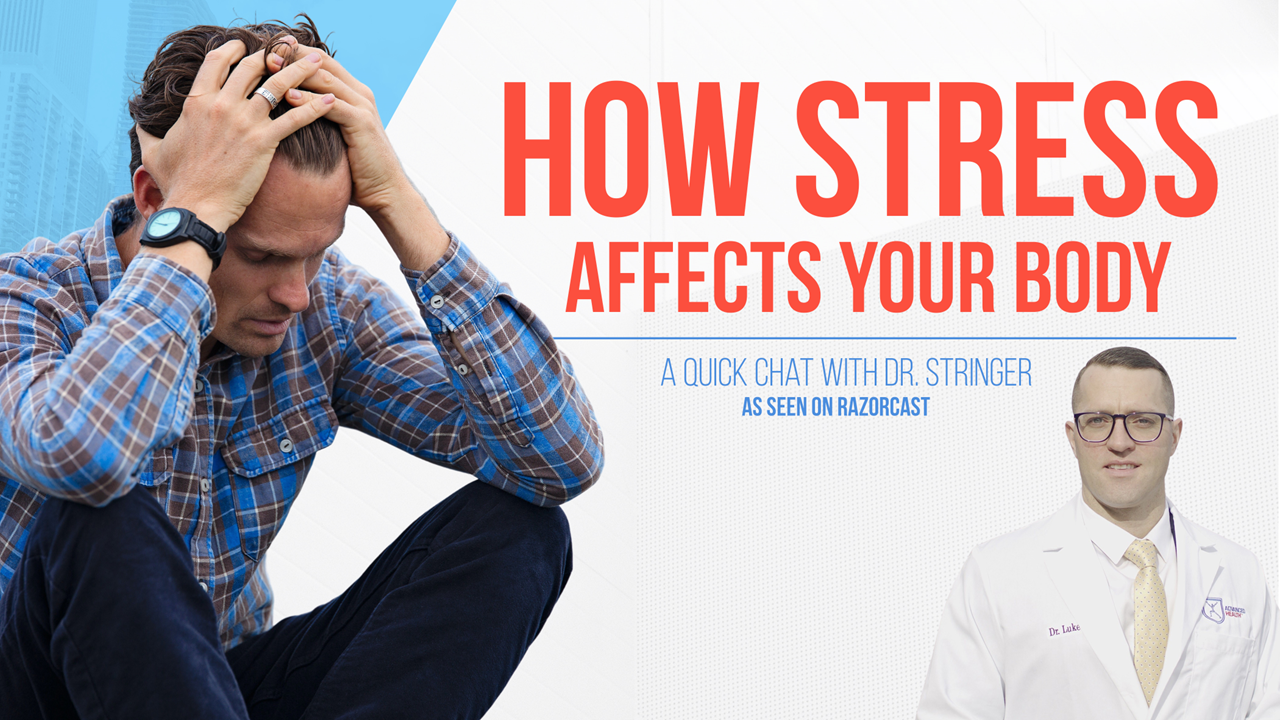
There are different types of stress that can create different types of tension in the body. When stress is in the environment, it can manifest and take many different forms of signs or symptoms within the human body. Physical tension within the tissues could easily be coming from postural changes that have occurred from micro stresses, from your corporate lifestyle, i.e. being in average to poor ergonomics over time. When you evaluate good posture in the neck, the ear should be sitting on top of the shoulder. But as we start to shift forward in that anterior head carriage, that means your head just starts to shift in that forward plane that’s obviously going to create stress and tension in the muscles in your neck and your upper your back. That’s obviously going to create pain and dysfunction.
Let’s say we have a diet that has a really high caffeine intake, which is diuretic. That means that we’re really dehydrated. Dehydrated tissue is going to get kind of tight and stiff and sore and it’s going to be unhealthy. That manifests into tension.
We have two types of a nervous system, sympathetic and parasympathetic. The sympathetic nervous system is our stress response. For example, you just got rear-ended, the hairs on the back of your neck stand up, your eyes are wide open.
People don’t necessarily realize the physiological effects stress can have in our bodies. If you’re chronically stressed from poor diet, poor posture or a high stress work environment, then that’s going to activate our sympathetic nervous system, and that’s going to increase tissue tug.
We practice downtown in Chicago, and 95% of our patients are corporate athletes. They are all professionals who work extremely hard. Their life is full of stress, postural stress, and work environment stress. And then a lot of patients’ hydration and diet are probably not where they need to be due to that stress. So, we tend to see that manifest in what we call those lifestyle diseases.
People, when chronically stressed, have the inability to sleep well, insomnia, the inability to digest food well, GI issues, issues within the thyroid, sleep, mood, energy levels, metabolism, and the inability to lose weight or gain weight.
Chronic stress is going to play a huge role in the physiological system of our body. It could be the GI or the renal, and that seems to manifest into those classic symptoms we see in the office of GI or thyroid issues. We treat a lot of people with those lifestyle conditions in the office. And they don’t necessarily come in for that; they come in more for the pain. But once we do the detailed histories and x-rays, we’ve realized that they’ve got secondary, tertiary symptoms along with pain, which manifests into dysfunction in the organ system, for example.
So, let’s imagine we’re in poor posture, and we’ve been in poor posture for 5 – 10 years. Our spines are out of alignment, we’ve got a lot of micro stress from our workday, sitting, standing in one place, our diet is not great, we’re not moving as much as we should, and there is a high stress work environment.
Patients typically come through the door due to pain. But poor posture will create stress and tension on the nerves in the upper part of your low back, or the lower part of the mid back and that creates stress on the nerves that innervate the GI systems. So typically, we have a lot of patients that come in with GI issues: irregular gassy bowel movements.
When you are in poor posture and you have a poor neck curve, your head starts to shift forwards. It creates a lot of tension in the upper back. Those nerves in your upper back innervate the esophagus. We have a lot of patients coming in with reflux, indigestion, heartburn, and things of that nature.
Chiropractic care can, in conjunction with good ergonomics, postural breaks, good rehab, and good lifestyle choices, address these negative effects of stress long term and keep us feeling and functioning as we should: pain-free without restriction.
Chiropractic adjustments relieve the stress and tension on joint tissue, but specifically the nervous system so you can function at an optimal rate. If you can remove the stress and tension that is on a nerve and allow that nerve to function optimally, i.e. stress free, then the organ that nerve is innervating, or the bodily system that nerve innervates, is also going to function better.
